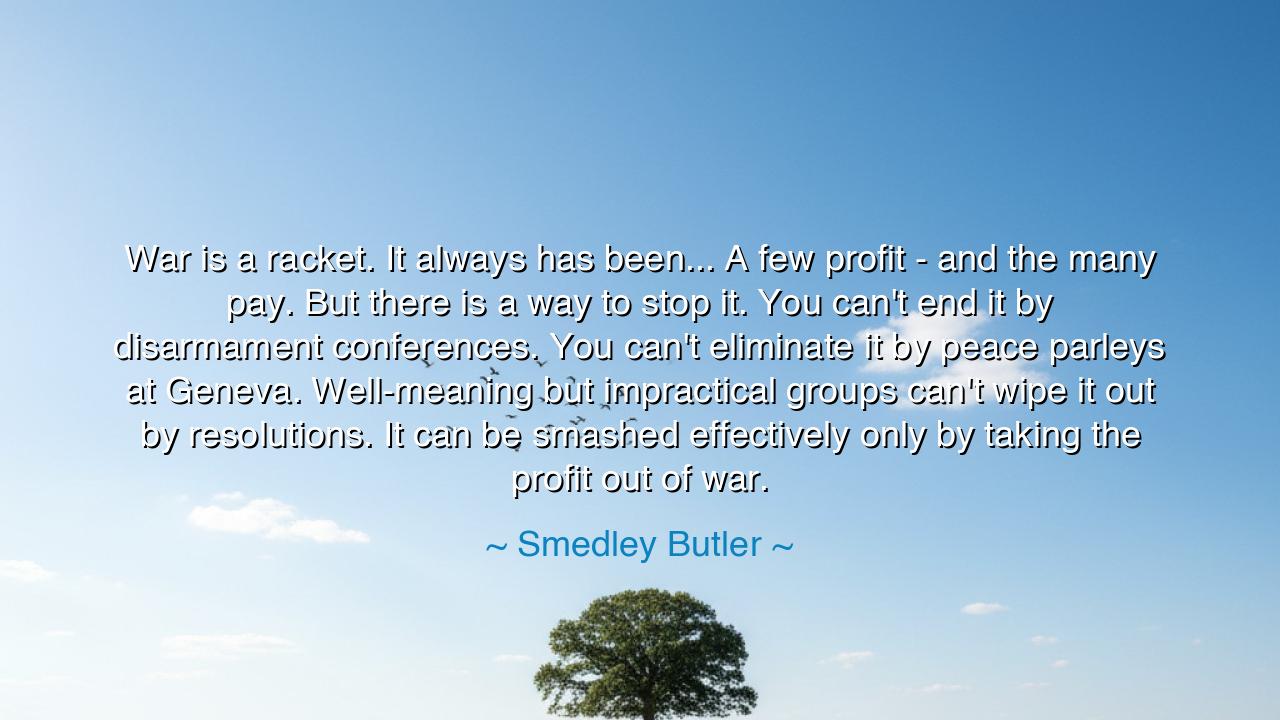
War is a racket. It always has been... A few profit - and the
War is a racket. It always has been... A few profit - and the many pay. But there is a way to stop it. You can't end it by disarmament conferences. You can't eliminate it by peace parleys at Geneva. Well-meaning but impractical groups can't wipe it out by resolutions. It can be smashed effectively only by taking the profit out of war.






Smedley Butler, a U.S. Marine Corps general who fought across continents and bore the weight of two Medals of Honor, spoke with the clarity of one who had seen too much blood spilled for the gain of too few. He declared with unflinching honesty: “War is a racket. It always has been… A few profit—and the many pay. But there is a way to stop it. You can’t end it by disarmament conferences. You can’t eliminate it by peace parleys at Geneva. Well-meaning but impractical groups can’t wipe it out by resolutions. It can be smashed effectively only by taking the profit out of war.” These words, forged not in theory but in the furnace of battle, cut through illusions like a sword. They reveal war not as noble destiny, but as a scheme where the weak are sacrificed on the altar of wealth and ambition.
When Butler calls war a racket, he strips it of the masks that rulers and profiteers often place upon it. He reminds us that behind banners and patriotic speeches, war too often becomes business. The few profit—arms manufacturers, financiers, corporations—while the many pay—soldiers with their lives, families with their grief, and nations with their treasures. His words echo the bitter wisdom that the soldier on the front line rarely fights for his own interest, but for gains that others will reap.
History confirms this with grim consistency. In the First World War, millions of men perished in muddy trenches while industries supplying weapons and provisions reaped fortunes. Entire towns were emptied of youth, yet shareholders counted profits in gold. The blood of the many became the coin of the few. Butler himself served during these years, and what he witnessed carved these truths upon his soul: that the rhetoric of honor often hides the reality of exploitation.
He warns, too, against the belief that war can be ended merely by lofty conferences, disarmament talks, or diplomatic resolutions. These, he calls “well-meaning but impractical.” For so long as war remains profitable, men with influence will always find ways to stir conflict, to ignite fear, and to drive nations into combat. Peace cannot be secured by paper alone; it must be built by removing the very fuel of war—profit. This is Butler’s radical demand: to break the link between death and wealth.
Consider the wisdom of the ancients: in Rome, as the empire expanded, generals enriched themselves with plunder while common soldiers bled across foreign lands. The conquests fed the coffers of the powerful, even as the Republic decayed from within. The philosopher Sallust observed bitterly that greed had corrupted Rome, and conquest had become an enterprise of profit rather than necessity. Butler’s voice, centuries later, resonates with the same warning: until the profit is severed, war will continue to devour the many for the sake of the few.
The lesson here is both grim and liberating: if humanity is to end war, it must not be through words alone, but through justice. Citizens must demand accountability, must watch where money flows, must challenge those who stand to gain from conflict. To take the profit out of war is to make it a burden rather than a prize, to strip away the incentives that seduce leaders into sacrifice of others. This requires courage, for the profiteers are powerful, but history teaches us that no empire of exploitation can stand forever once the people awaken.
So, O listener, take Butler’s words not as cynicism but as a call to arms of another kind—a call to vigilance, to truth, to the defense of peace by exposing greed. Do not be deceived by the gilded words of those who profit from bloodshed. Ask always: who gains, and who pays? Guard yourself and your people from being used as fuel for another’s fortune. For if the world heeds Butler’s wisdom, then perhaps one day the cry of “War is a racket” will no longer ring true. But until that day, let these words be a torch: to guide, to warn, and to awaken.
In the end, Butler’s lesson is eternal: war will end not through treaties, but through justice; not through parlays, but through truth. Let us labor, then, to take the profit out of war, so that peace may no longer be the dream of the many and the fear of the few, but the inheritance of all.






AAdministratorAdministrator
Welcome, honored guests. Please leave a comment, we will respond soon